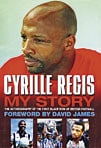 The Autobiography of the First Black Icon of British Football
The Autobiography of the First Black Icon of British Football
by Cyrille Regis
Andre Deutsch, £18.99
Reviewed by Neville Hadsley
From WSC 288 February 2011
Football autobiographies are often a bit of a tease, promising to let fans of particular clubs behind the scenes, in exchange for a wad of cash. This effort from Cyrille Regis, ghost-written by Chris Green, attempts to confound that cliche and reach instead for redemption.
Coming more than 14 years since his last League appearance and 23 years after his greatest moment in football – winning the FA Cup with Coventry City – this book is hardly timely. But it does allow Regis to lay bare his soul in what, at times, reads like a confession.
Regis's spiritual home was, and is, The Hawthorns. During his seven years at West Brom, after signing as a raw 19-year-old in 1977 from non-League Hayes, he made his name and earned international recognition as a powerful striker with an ability to leave defenders in his wake. Culturally and emotionally it was also a pivotal time. Black players were beginning to emerge as a force in the English top flight and Regis, perhaps more than any other player (with the possible exception of the ill-fated Laurie Cunningham), bore the brunt of the malignant racism that spewed off the terraces.
West Brom manager Ron Atkinson, in his typically crass manner, dubbed Regis, Cunningham and Brendon Batson "the Three Degrees" and Regis paints a graphic picture of life for a black player in a hostile white environment. Yet the biggest theme to emerge is the one that finds Regis in search of salvation, even forgiveness. While in his later years at Coventry, Regis became a born again Christian and his recollections of his career are often revealed through this
particular prism.
Thus his (and his Coventry team-mates') legendary excesses with drink in the seasons before and after their defeat of Tottenham in the 1987 FA Cup final now seem to shock even him. Moreover, his infidelities and his perceived failures as a father to his two children are also raked over. Much of this picture is painted with a broad brush, and it's hard not to feel that most of the telling detail, which might have made this book more revelatory, ended up, as it were, on the cutting room floor.
Nevertheless, it's a book that rewards reading. Regis's account of his childhood – first in French Guiana where he was born and then in 1960s London – is fascinating. His meteoric leap from the Isthmian League to the old First Division, having played just two seasons as a semi-pro and never having been on the books of any League club, is also finely documented here. And while there is a certain degree of repetition consistent with the conversational, dictated style of the book, it is, by and large, well and sensitively written.
The distance between the rewards of top professionals then and now – Regis's highest wage came close to the very end of his career, when joining Aston Villa – also proves a timely reminder that the excesses of today are a very recent development. Unlike many of this genre, Regis attempts to put the warts-and-all account of flawed human beings who just happen to play football into a moral context. That does give this book a more satisfying feel, even if that context – religion – is not to your taste.